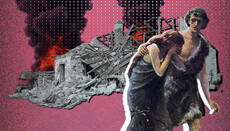The Good Samaritan against digital noise: A parable as diagnosis

The road to Jericho is your social-media feed, and the robbers are your gadgets. Let us explore why the modern person is “energetically plunged into darkness” and how the Jesus Prayer treats ADHD.
The theme of today’s reflection is the Parable of the Good Samaritan. The traditional interpretation of this parable, as presented for example in century-old Law of God textbooks, does not warm my soul. The Word of God is spoken for all ages, and in every epoch it resounds anew. Mechanically repeating the way the Fathers and Teachers of the Church explained it a thousand years ago would be a mistake. They spoke to the people of their time in a language that those people could understand.
Times change, the conditions of life change, and the very language of human communication changes. If we do not actualize the Word of God within the realities in which we now live, it will turn from the Book of Life into a museum exhibit.
The Parable of the Good Samaritan is, on the one hand, a diagnosis of modern society and, on the other, a guide to action.
In it, we should try to see not only a moral imperative but also a theological formula of salvation.
The road to Jericho: The hell of the digital paradigm
The road from Jerusalem to Jericho is not a geographical journey. It is the tragic rupture between creature and Creator, between wholeness and fragmentation. This road is paved not only with obvious passions and vices. It is laid with the cobblestones of information streams: the Internet, social networks, endless scrolling and news feeds. These robbers have robbed us of peace, quiet, and time for prayer. Our mind is wounded by constant distraction.
We live with what is now called Attention Deficit Hyperactivity Disorder (ADHD).
It is a disturbance in brain functioning, marked by loss of concentration and impulsivity. Today we see a global rise in anxiety and panic disorders. Thirty years ago medicine did not know this diagnosis. Now it is a “disease of the metropolis.” Modern young people grow up with the pathology of superficial knowledge; Internet addiction has become the norm.
Information streams are not merely thieves and robbers. They are ontological parasites, destroying the fundamental principles of human existence, breaking apart the unity of soul, spirit, and body. As a result, people cease to live a normal human life. They begin to exist in the hell of the digital paradigm, which camouflages itself as an earthly paradise. And the consequences are burnout, depression, and an inner emptiness of heart.
The modern scattered mind is the direct consequence of this existential trauma.
It has lost its single orientation toward God, becoming fragmented and captive to the world of Jericho – that is, to every form of external noise. A human being, created to dwell in the Light, is now energetically immersed in darkness.
The priest and the Levite: Why “accumulative faith” will not save
The priest and the Levite are those who pass by. They see the suffering but do not approach. The traditional interpretation points to the insufficiency of the Old Testament. But in essence, it is the insufficiency of any formal piety.
One may attend church, read daily prayers, read Scripture, confess, commune – and yet remain spiritually empty. Pharisaic theology tries to comfort us. It proposes a doctrine of accumulative soteriology. “Don’t worry,” the scribes say, “everything goes into your savings book stored at the post office of the Heavenly Jerusalem. When you die, you go to the gates of Paradise, give your account number, and they will give you everything you earned.”
They will not. That is not how salvation works.
Any external religiosity without deep inner spiritual practice, without plunging the mind into the heart, without experiential knowledge of God, is the priest and the Levite who simply pass by.
Such faith remains “passing by” because it cannot approach the wound that requires a divine–human action.
To the “passing-by” we can also add virtual compassion. We see someone’s tragedy in the news or on social media, we press “like” or type a sympathetic comment – but physically and spiritually we do not draw near. We live inside a cocoon of our virtual bunker, while perhaps in our own building, or just next door, someone is dying alone in their apartment. And this is not imagination – such cases truly increase. Neighbors are often the first to find out. But only because of the smell from under the door. Though it would have been possible to show interest in that person’s life before their death.
Christ the Samaritan: The Wine of repentance and the Oil of prayer
In the traditional interpretation, the Samaritan is Christ Himself, the Second Person of the Holy Trinity. His action is not simply moral but hypostatic – personal and essential. It manifests itself in the kenosis (self-emptying) of the Divine Logos.
Christ descends from the heavenly hierarchy of Jerusalem into the mud of Jericho, taking upon Himself our wounded flesh.
He gives us His Wine – His Blood – which burns and disinfects. This requires our endurance in the pains of life’s journey and in ascetic practice. Christ gives us His Oil – the Grace of the Holy Spirit, His Uncreated Energies, which soothe and heal our hardened hearts, making them capable of receiving the Light.
The Samaritan takes the wounded man to an inn. This is not only the image of the Church of God. The inn is also the image of our heart. It is there that we must undergo healing.
The inn of the heart: Hesychia against scrolling
The first step is to lock the heart against sinful thoughts and useless information. To learn the art of ending inner and outer noise. In practical terms this means controlling gadgets and time spent online. A conscious rejection of multitasking. A search for hesychia – true silence – even for half an hour a day.
The goal is the restoration of the mind’s single rule. The mind must govern the passions as an angel governs the lower orders.
This is the “standing of the mind” in the spiritual center, the cessation of the fragmentation of modern digital consciousness. It is the transition from multiplicity to unity – from the chaos of sin to collectedness in Christ.
This is the practice of healing through Wine. But what of the Oil? The Oil is the Jesus Prayer. It is an IV drip – the true therapy for the modern person.
Calling upon the Name of Christ is not merely a prayer but an ontological act. The Name of Christ bears His Energy. By pronouncing the Name of Christ, we bring the Savior Himself – the Samaritan – into the inn of our heart. This practice heals the essential rupture of Adam. The mind, returned to the heart, ceases to be external rationality and becomes the Eye of the soul – the organ of direct, supra-rational perception.
Hesychasm is divine anti-stress: it does not merely focus attention, it invokes the Person – the Lord Jesus Christ – into the home of our soul.
When the mind, pulled out of the swamp of information streams, returns to the heart, a person regains integrity. He becomes whole and gathered, in contrast to the modern fragmentation and universal spiritual orphanhood.
When, invoking the Name of Jesus, we cleanse the inn of our heart, Christ the Samaritan enters and enlightens it with His Light, delivering us from existential darkness and the sense of meaninglessness.
When the heart becomes a temple, it is illumined by the Light of the Transfiguration. This is the ultimate goal – deification.
So that the person wounded by the robbers may not simply revive, but become a god by grace and a child of the Light.
“Go, and do likewise”: leaving the capsule
The parable ends with a call: “Go, and do likewise.” Step out of the digital capsule of your own comfort and fear. Draw near to your neighbor – not through a repost, but physically, sacrificing real time and personal rest. Do not spare your denarii. If we wish to be saved, we must use all our resources – time, money, abilities – to help the wounded. This must be an active love that demands no gratitude and seeks no public approval.
In a world divided by politics, nationality, war, and hatred, the neighbor is the one who needs your mercy, regardless of status, religious view, or social position.
In an age when the world offers millions of virtual realities and distractions, hesychasm offers a single, authentic Reality: the Face of Christ in the purified heart. Only when healed and deified can the modern Christian become a true Samaritan to others, bringing not merely human aid but the Oil and Wine of Christ’s Grace.












